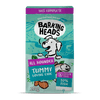TV Vet Dr Scott shares dog dental care secrets

TV Vet Dr Scott shares dog dental care secrets
When it comes to your pet's eating habits, some owners may call their pups fussy while others may be dealing with a poorly pooch that can't express themselves.
Without being able to verbally make their owners aware of a toothache or other oral problems, dogs often turn to fussy eating, preferring softer foods that don’t cause as much discomfort, as poor dental health can make it hard for your pet to eat harder kibbles. Our vet, Dr Scott Miller, shares what to look out for if you suspect an injury in your dog's mouth and the steps owners should take to help pups recover.
Why is dental care so important for pets?
Like us, dogs need the occasional trip to a dentist – well, their vet – for an oral examination. During these visits, your vet will give your dog’s teeth a comprehensive check to determine any visible or underlying conditions in their mouth that you may have overlooked or not noticed. They will also assist and give guidance on daily care if needed.
How can you tell your dog is suffering from an oral injury?
If you’re having trouble deciphering whether your dog is picky or in pain, you can first take a look at how they are eating the food they choose to eat. Are they taking smaller mouthfuls than normal? Are they being more cautious when chewing? Are they chewing on only one side of their mouth? All these signs suggest your pooch may be in pain. Some owners may also find their dog refusing kibble and preferring wet food when they previously didn’t have a preference; this can be another sign of oral discomfort. However, if they're happily eating as usual, just with one food over another, you may have a fussy eater on your hands.
Some other signs your dog needs to visit a dentist:
- Bad breath (halitosis)
- Unusual swelling in their face
- Bloody saliva
- Weight loss
- Plaque & tartar build up early.
- Inflamed gums
- Loose or missing teeth
- Cracked or damaged teeth
If you notice one or more of these signs, call your vet for further assistance, as some of these signs may lead to greater injury to your pet. For example, excess plaque build-up could cause inflammation along the gums (otherwise known as gingivitis) if not treated, and halitosis may be a sign of periodontal disease.
What dental treatment is offered by vets?
Your vet can check for dental issues and diseases and carry out the correct course of treatment for that disease. This may include surgery or placing your dog on antibiotics. They may also be able to locate and remove damaged teeth if necessary, ensuring your pet is right as rain, eating and drinking as usual.
What can you do for your dog?
You should keep an eye on the condition of your dog's teeth and mouth at home with a quick examination of their teeth and gums. This can be done by gently pulling your dog's lips up over their teeth to check gum condition and looking at their teeth for any damage. This will allow you to notice any physical changes before they become too painful for your dog. You can also assist them by giving them dental chews to help reduce plaque build-up in their mouths and help with their breath.
If your dog has had a procedure done, they may need extra help keeping their teeth clean. You can use a finger brush and dog-friendly toothpaste (human toothpaste contains xylitol, which is toxic to dogs). To get the best clean, use circular motions, massaging the teeth and gums. Build this up from a few seconds to a few minutes over time. Like most things, dogs must be trained to enjoy (or simply tolerate!) this activity.
Pet parents should also ensure their dog doesn’t chew things that could damage their teeth when out on walks.
Do all dogs need close monitoring of their teeth?
Not all dogs need heavy monitoring, but some breeds are predisposed to dental issues and will need a little extra help keeping their teeth clean. Some small breed dogs like Yorkshire Terriers and Pomeranians can be prone to having teeth that grow irregularly in their mouths, leading to some teeth protruding from their mouths or leaving uneven gaps between teeth. In these cases, food can get stuck between teeth, putting them at risk of gum disease. Dachshunds and Chihuahuas also face a higher risk of gum disease than other breeds.
Consider your dog in your nightly routine, brushing your teeth and then theirs. Small routine tweaks can improve your dog's health in the long run and save you from costly vet trips – when a dental issue could affect your dog’s relationship with their food, regular checks will ensure their mealtimes are always enjoyable.
Share Article

Tummy Lovin' Care Fish Dry Dog Food - All Hounder
£14.99 - £64.99

Bowl Lickin' Goodness Lamb Dry Dog Food - All Hounder
£14.99 - £64.99

Fat Dog Slim Chicken Light Dry Dog Food - All Hounder
£14.99 - £64.99

Fuss Pot Duck Dry Dog Food - All Hounder
£14.99 - £64.99


